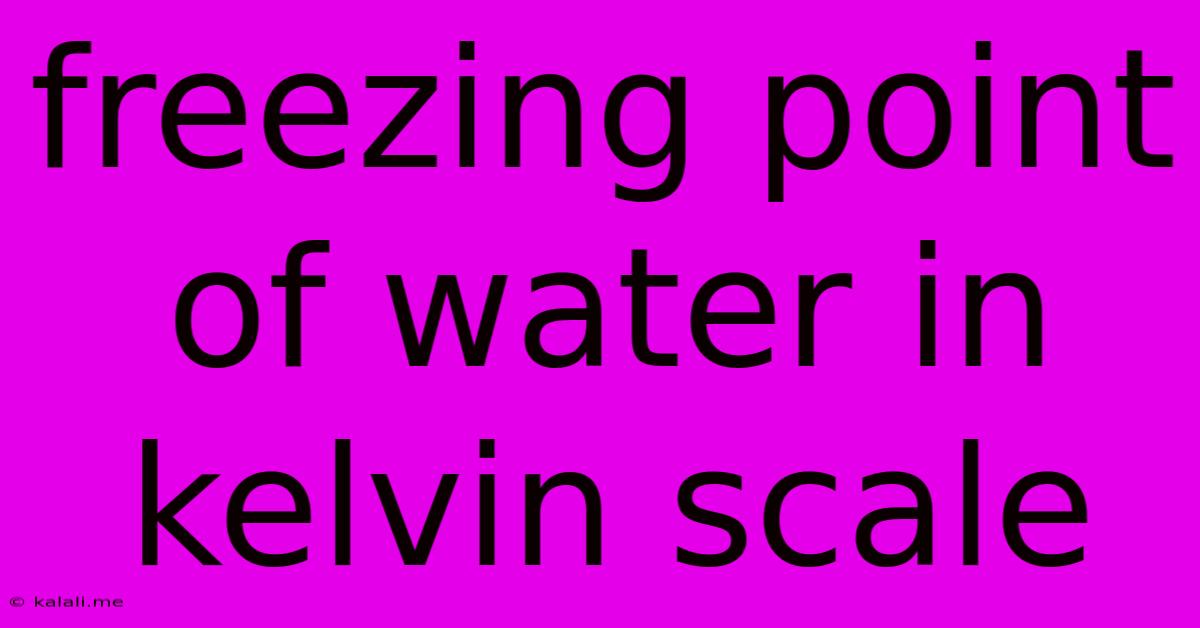Freezing Point Of Water In Kelvin Scale
Kalali
Jun 05, 2025 · 3 min read

Table of Contents
Freezing Point of Water in Kelvin: A Deep Dive
The freezing point of water is a fundamental concept in science, crucial for understanding various physical and chemical processes. While most people are familiar with the Celsius and Fahrenheit scales, understanding the freezing point of water in Kelvin is vital for many scientific applications. This article will delve into the specifics of this temperature, its significance, and its implications. We'll explore how it's determined, its relationship to other temperature scales, and its importance in fields like chemistry and physics.
What is the Kelvin Scale?
The Kelvin scale, also known as the absolute temperature scale, is a thermodynamic temperature scale where zero (0 K) represents absolute zero—the theoretical absence of all thermal energy. Unlike Celsius and Fahrenheit, which use arbitrary reference points, the Kelvin scale is based on the fundamental properties of matter. This makes it a preferred scale for scientific calculations and research.
Freezing Point of Water in Kelvin: The Answer
The freezing point of water in Kelvin is 273.15 K. This seemingly simple number is a cornerstone of numerous scientific calculations and experiments. It represents the temperature at which liquid water transitions into solid ice under standard atmospheric pressure.
The Relationship Between Kelvin and Celsius
The Kelvin and Celsius scales are closely related. The difference between them is simply a constant shift. To convert Celsius to Kelvin, you add 273.15. Therefore, the freezing point of water at 0°C is equivalent to 273.15 K. This simple conversion formula allows scientists to easily switch between these two widely used temperature scales.
Why is the Kelvin Scale Important in Science?
The Kelvin scale's importance stems from its absolute nature. This absolute zero point allows for precise calculations in thermodynamics, statistical mechanics, and other fields. Many physical laws and equations are expressed more simply and elegantly using Kelvin, making it essential for accurate scientific work. For example, ideal gas law calculations require absolute temperature. The Kelvin scale avoids the complexities introduced by negative temperatures inherent in Celsius and Fahrenheit.
Practical Applications of Knowing the Freezing Point of Water in Kelvin
Understanding the freezing point of water in Kelvin has numerous practical applications, including:
- Cryogenics: The study of materials at very low temperatures relies heavily on the Kelvin scale. Scientists and engineers involved in cryogenic technologies need to precisely control and measure temperatures close to absolute zero.
- Material Science: The behaviour of many materials changes drastically near their freezing point. Knowing the precise freezing point in Kelvin enables accurate modelling and prediction of material properties.
- Chemistry: Numerous chemical reactions are temperature-dependent. Accurate temperature measurement using the Kelvin scale is crucial for reliable chemical processes and experiments.
- Meteorology: While Celsius is commonly used in weather reports, the Kelvin scale plays a vital role in sophisticated meteorological models and predictions.
Beyond the Freezing Point:
While this article focuses on the freezing point, understanding the Kelvin scale is equally crucial for comprehending other key temperature points, such as the boiling point of water (373.15 K).
In conclusion, the freezing point of water in Kelvin (273.15 K) is more than just a number; it's a fundamental constant in science, underpinning countless scientific calculations and applications across various disciplines. Its significance in precision measurement and the absolute nature of the Kelvin scale make it indispensable for scientific accuracy and technological advancement.
Latest Posts
Latest Posts
-
Why Is Squirrel Girl So Powerful
Jun 07, 2025
-
How Long Can You Ride On A Spare Tire
Jun 07, 2025
-
How To Install A Whirlpool Dishwasher
Jun 07, 2025
-
How Do You Get A Frozen Car Door Open
Jun 07, 2025
-
Using Would Go To Mean Went
Jun 07, 2025
Related Post
Thank you for visiting our website which covers about Freezing Point Of Water In Kelvin Scale . We hope the information provided has been useful to you. Feel free to contact us if you have any questions or need further assistance. See you next time and don't miss to bookmark.